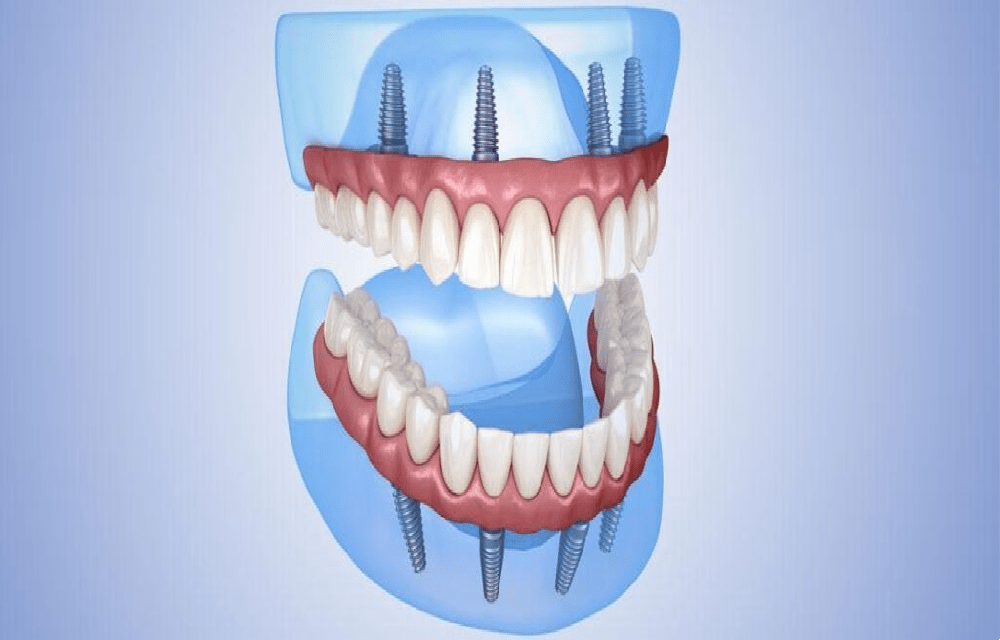Novusklinik

Call us
Allon-4 Implant
All-On-4 Implant All-on-4 is a treatment option that is applied especially in the back areas for bone deficiency and allows...
Read more...Implant Treatment
An implant is the most natural treatment method to eliminate missing teeth. The screw-shaped implant placed in the jawbone in order to replace the missing tooth functions like the root of a natural tooth. Dental implants are materials that are 100% compatible with human biology. They are mostly made of titanium, and zirconia and ceramic implants have started to be used optionally in recent years.

Frequently Asked Questions About Implant
How Is Implant Treatment Performed?
Radiographic examination is essential for implant treatment. In this examination, the bone structure of the person is clearly identified and the bone structure needed for the placement of the implant screw is determined. A treatment plan is prepared for the person who meets the bone density and other eligibility criteria. In this customized plan, the implantology specialist determines the appropriate type and length of the implant.
[Depending on the suitability of the person and the type of implant, the treatment is completed either in a single stage or in two stages.]
How Is One-Stage Implant Treatment Performed?
In one-stage treatment, it is possible to establish the superstructure of the implant immediately; that is, to attach the new permanent tooth immediately. “72-Hour Implant and Permanent Teeth” treatment, which is the specialty of Novus Clinic and available in very few clinics in Europe, is the best example of a one-stage implant. With this treatment, it is possible to get permanent teeth in 1 to 3 days.
[72-Hour Implant and Permanent Tooth Treatment, which has a very different philosophy from the classical implant application, can be performed by experienced implantology specialists and clinics with access to advanced technology.]
How is Two-Stage Implant Treatment Performed?
The implant, which is placed in the jawbone, is covered with the gum and the cap is placed after the healing process.
[In two-stage treatments, you will continue your daily life with temporary teeth to be used during the healing process if the mouth structure is suitable.]
How Long Does the Implant Procedure Take?
Depending on whether the implant is placed in the lower or upper jaw and the structure of the bone, the surgical procedure is completed in 5 minutes to 1 hour. The period for the implant to fuse with the bone varies between 2 and 6 months. A healing period of 2-3 months is required for the implant placed in the lower jaw, and 3-6 months for the implant placed in the upper jaw.
[At Novus Clinic, we tell the waiting time in light of scientific data, according to the result of the measurement we perform with the help of a special device after the implant is placed.]
Will it hurt while Implant is placed? Since the area to be implanted into will be anesthetized with local anesthesia, the pain felt is the same as in the other dental treatments.
[Although the implant is a surgical procedure, the person does not experience pain during the operation.]
What are the advantages of Implant?
✓ The implant is the most suitable treatment method for natural tooth structure.
✓ Healthy teeth are not cut and damaged while placing the implant.
✓ The implant enables chewing as functionally as a natural tooth.
✓ Oral and dental aesthetics is provided with the implants.
✓ Thanks to the compatibility of the implant with human biology, no speech disorder is experienced.
✓ The implant does not exert disproportionate pressure on the jawbone and the bone health is maintained.
✓ Implant treatment allows all kinds of tooth deficiencies to be eliminated.
[Implant looks and feels like a natural tooth. It is permanent because it fuses with the jawbone.]
What is the Lifetime of the Implant?
Dental implants are made to stay in the mouth for life. However, this period is determined by the care given to oral and dental hygiene and genetic factors.
[Implant is an extremely durable and of long-lasting material. The durability of the implant is in the hands of the person using it.]
What is the Success Rate of Implant Treatment?
The success rate of dental implant procedures that have been performed for more than 50 years is 95%.*
[The experience of the dentist, the quality of the implant brand, the bone structure of the person, and the importance given to oral hygiene all determine the success of the implant.]
What Should I Pay Attention to After Implant?
Oral hygiene should be ensured. Apart from routine tooth brushing, hygiene should be provided by using special threads, interface brushes, and mouth showers recommended by your dentist.
Which Brand of Implant Is Better?
There are more than 150 implant brands in Turkey. The number of implant brands in the world is over 500. At Novus Clinic, we take into consideration the following criteria when choosing an implant brand: the success of the implant brand should have been confirmed by scientific research, the company should have been operating in Turkey for at least 10 years, and the company should have clean records.
The implant brands we chose in line with these criteria are companies that have ADA (American Dental Association), FDI certificate (The FDI World Dental Federation), CE approval, and permission from the Ministry of Health. In this way, the implant brands we work with are reliable companies that provide a lifetime guarantee against any possibility of error arising from the production of the implant and provide worldwide service.
[We procure all products from authorized distributors to guarantee authenticity.]
Can Every Dentist Perform Implant Treatment?
Implant treatment is a surgical procedure that requires special expertise in dentistry. Therefore, it is not appropriate for dentists who do not have the expertise to perform implant treatment.
[It is best for the treatment to be performed by an oral, dental, and maxillofacial surgeon and an implantology specialist.]
Can Anyone with a Missing Tooth Have Implants?
People who are at 18 years of age and older, who have completed bone development and do not have health problems that may cause surgical complications, can have implants comfortably.
[Implant is not suitable for people under the age of 18 since their growth and development phase have not been completed.]
Consultation with the dentist and other physicians is required in the following cases:
– Diabetes
– Hypertension
– Chronic cardiovascular diseases (heart disorders)
– Hemophilia (blood clotting problem)
– Use of blood thinners
– Radiotherapy treatment for the head and neck region
– Autoimmune (immune system) disorders
– The use of corticosteroid drugs (hormone suppressors) In such cases, the implant application can be decided upon consultation with the implantology specialist and other physicians. In addition, implants may be risky in the following cases:
– Excessive smoking
– Alcohol and drug addiction In the cases mentioned above, the chances of success of implant treatment decrease. It would be appropriate to postpone the implant treatment of pregnant people with the help of other solutions.
Adults who do not have sufficient bone tissue or density to place the implant may require pretreatment to build and strengthen the bone.
Would you like us to call you and give information?
Contact us for detailed information about our treatments and for an appointment.
Novusklinik at Instagram
Error: No feed with the ID 1 found.
Please go to the Instagram Feed settings page to create a feed.
Novusklinik at Youtube

Call us
Allon-4 Implant
All-On-4 Implant All-on-4 is a treatment option that is applied especially in the back areas for bone deficiency and allows...
Read more...
